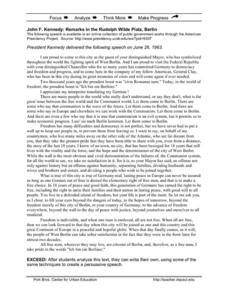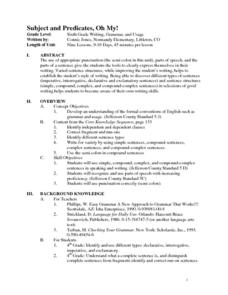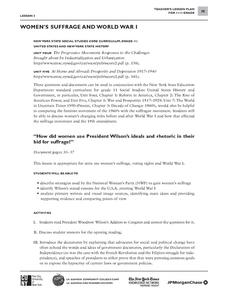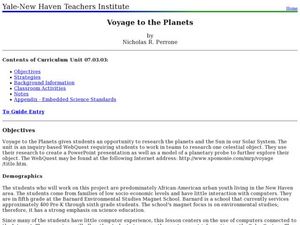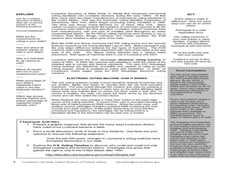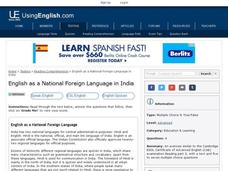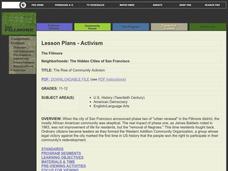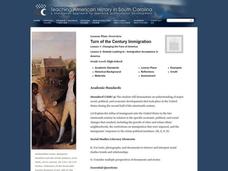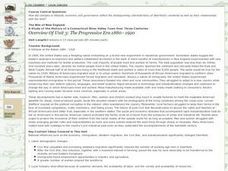Polk Bros Foundation
John F. Kennedy: Remarks in the Rudolph Wilde Platz, Berlin
“Ich bin ein Berliner.” Here’s the full text of John F. Kennedy’s famous address delivered to the people of Berlin on June 26, 1963. The resource could be used as part of a study of Kennedy’s presidency, of rhetorical devices, or as...
Roy Rosenzweig Center for History and New Media
The Homestead Act
To understand how the Homestead Act of 1862 changed the US and the lives of the people during that time, class members examine primary source materials including letters, broadsides, and images. They then assume the voice of a...
Library of Congress
Industrial Revolution
Could you live without your phone? What about cars, steel, or clothing? Class groups collaborate to produce presentations that argue that either the telephone, the gramophone, the automobile, the textile industry, or the steel industry...
Curated OER
Carl Sandburg's "Chicago": Bringing a Great City Alive
Students examine the historical and cultural context in Sandburg's poem. The poetic devices of personification and apostrophe are utilized in the poem and identified by Students.
Curated OER
Journey to America
Fifth graders carefully analyze the artwork, Les Emigrants, and explore the reasons that people emigrated to the United States, and what life was like for new arrivals. They discuss what things immigrants were able to bring with them and...
Curated OER
Lesson: Lisa Signal: Altering Perspectives
Kids make big artistic gestures, just like the abstract artist, Lisa Signal. They use her work as inspiration for making simplistic, abstract, statements in an artistic way. They analyze her work, then walk through an unfamiliar...
Curated OER
Fifth Grade Social Studies
For this social studies worksheet, 5th graders answer multiple choice questions about World War II, the transcontinental railroad, slavery, and more. Students complete 25 questions.
Curated OER
For the Love of Publication!
What is a ‘Zine? Although the referenced PBS video that launches this study of self-published magazines is not available, the activities detailed and the step-by-step directions for creating ‘Zines would engage young writers. This...
Alabama Department of Archives and History
Alabama's 1901 Constitution
"We, the People of the State of Alabama. . ." Did you know that the Alabama State Constitution has 357,157 words while the US Constitution has only 4,400? And that it has 798 amendments while the US Constitution has 27? Class groups...
Alabama Department of Archives and History
Cells for Sale - Convict Leasing in Alabama
The benefits and drawbacks of convict leasing following the Civil War are the focus of a lesson that asks groups to examine primary source materials to gain an understanding of the program before individuals decide whether they are in...
Curated OER
Subject and Predicates, Oh My!
Eliminate all doubt when it comes to sentence structure with nine thorough lesson plans. Whether you want your young writers to vary their sentence structure or shore up their knowledge of conjunctions and semicolons, these lessons are a...
City University of New York
Woman's Suffrage and World War I
How did women use President Wilson's ideals and rhetoric in their bid for suffrage? To answer this essential question, class groups analyze primary written documents and visual images.
Gobal Oneness Project
Sports for Social Change
After watching a short online film about a soccer player Nolusindiso Plaatje and his help with the Grassroot Soccer program, a community education effort aimed at spreading awareness about HIV/AIDS prevention, use a lesson plan to prompt...
Curated OER
Voyage to the Planets
Students examine the planets in the solar system. In this planetatry lesson students complete a project using a WebQuest program.
Curated OER
Washington Irving in Context
Students examine the various roles Washington Irving had in his lifetime. Examining the situation in Europe and the United States, they are encouraged to relate Irving's experiences to different events. They examine themselves in many...
Curated OER
Orphan Trains
Students are introduced to the concept of orphan trains. In groups, they research the history of the New York Children's Aid Society and begin to identify the social-trade offs involved on the orphan trains. They examine the geneological...
Curated OER
How We Vote
Students fill in a graphic organizer and discuss the struggles in groups about the history of voting in Louisiana. Students also explore a voting timeline to see who could and could not vote before and after 1850.
Curated OER
English as a National Foreign Language in India
This reading comprehension worksheet includes a passage on the two national languages of India, followed by 6 multiple choice questions. Just click at the bottom of the form for the score!
Curated OER
Building Suburbia: Highways and Housing in Postwar America
Students determine how suburbs changed America. In this post World War II activity, students complete research projects that require them to examine the growth of suburbs in the 1950's and 1960's. Students reveal how government policies,...
Curated OER
The Rise of Community Activism
Students examine the rise of citizen leaders and community organizing.
Curated OER
'Magic' Pablo Lesson
Students examine what goes into hero worship and establishing unlikely friendships. They probe the deeper meanings in "'Magic' Pablo" through small group dialog and use a variety of ways to process the story's meaning. They see the...
Curated OER
Turn of the Century Immigration
Students explore the immigration wave that hit the United States in 19th century. In this immigration lesson, students examine primary and secondary sources to determine what the immigration experience was like for new citizens. Students...
Curated OER
Busting More Myths Using the Scientific Method
Use the Mythbusters model to jazz up your scientific method lessons!
Curated OER
U.S. History: The Progressive Era
Students examine the Colonial Revival Movement as a response to industrialization and immigration. focusing on Deerfield, Connecticut, they create a documentary artifact reflecting the period.


